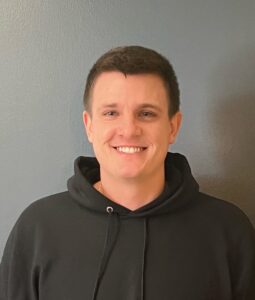Since the CHIPS Act was introduced in 2020, companies in the semiconductor industry have launched more than 90 projects in 28 states, amounting to nearly $450 billion in private investments (Peterson, 2024). These initiatives are expected to generate tens of thousands of new, high-quality jobs within the U.S. semiconductor industry and hundreds of thousands of associated jobs across the wider U.S. economy.
The growing need for skilled workers in the semiconductor industry is driving demand for new educational opportunities. Boise State’s Department of Electrical and Computer Engineering (ECE) is answering the call by creating new educational content, including semiconductor processing courses, undergrad certificates, and a new semiconductor emphasis for grad students.
Isaac Kreft is one of the students currently taking advantage of these new offerings from the ECE Department. A high-achieving undergrad, Kreft is earning his BS in Electrical Engineering and expects to graduate later this year. He’s also working to complete two of the Department’s new certificate programs, one focused on integrated circuit design and the other on semiconductor device physics. As if that wasn’t ambitious enough, Kreft has also decided to enroll in the department’s accelerated master’s program, which allows him to take graduate courses in his final year of undergraduate study and count the credits towards his master of science degree.

Kreft served in the Navy as an electrician focused on instrumentation and decided to pursue electrical engineering for a more in-depth understanding of the technical aspects of his work. Interested in hands-on research, Kreft took a position in Dr. Kris Campbell’s research lab. Under Campbell’s supervision, Kreft is working on optically gated transistors, making them into sensors that can be used in water treatment facilities to detect forever chemicals.
This summer, Kreft was honored to receive the Stellar Engineering Students Graduate Program Scholarship (SEnS GPS), a National Science Foundation S-STEM-funded program. NSF SEnS GPS is a program dedicated to providing financial, social, and academic support to master of science students in engineering who are searching for a close-knit graduate community in which they will be trained to address the perpetually changing needs of modern society. Thanks to this support, Kreft is planning to continue his graduate studies. His future plans include a DRAM internship at Micron next summer and a PhD focused on integrated circuit design and semiconductor devices.
If you’d like to help support scholars like Isaac, donate to the “Department of Electrical & Computer Engineering Fund” by visiting Boise State Giving and choosing our fund as the giving destination.
Peterson, D. (2024, April 24). Sia commends Chips Act incentives for Micron’s manufacturing projects in New York and Idaho. SIA News. https://www.semiconductors.org/sia-commends-chips-act-incentives-for-microns-manufacturing-projects-in-new-york-and-idaho/